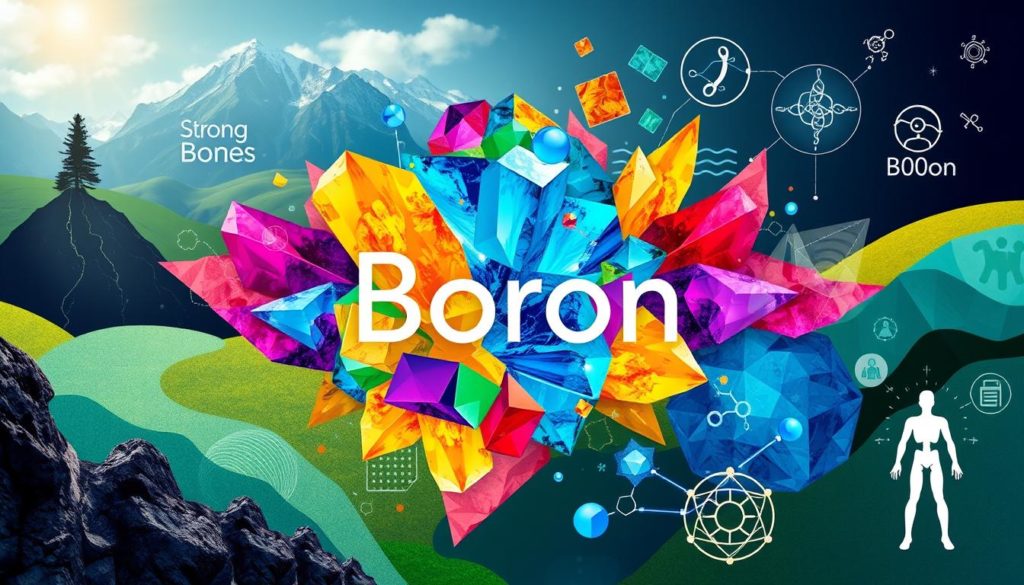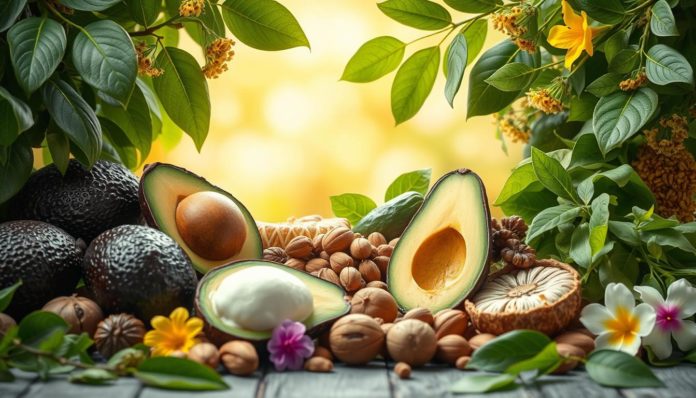Did you know that boron can greatly improve bone density? In those with osteoporosis, it raises it by up to 50%. This fact shows just how significant Boron health benefits are. It makes more people want to learn about boron’s value.
Boron helps with bone health and improves brain functions. Its health benefits are wide-ranging and backed by science. In our detailed look at Boron essentials, we’ll check out its key roles. We’ll see why adding this mineral to your life can make a big difference in your health.
What is Boron and Why is it Important?
Boron is a trace mineral that’s vital for our body. It plays a key role in many biochemical processes. Boron’s uses are vast, showing how important it is for health and industry.

Understanding Boron’s Role in the Body
Boron is crucial for our health. It helps our body process vitamins and minerals like calcium and vitamin D. This is vital for strong bones.
Moreover, Boron is good for our brains and hormones. It helps keep our minds sharp and balances our hormones.
Historical Uses of Boron
Boron has been used since ancient times. Egyptians used it for mummification, and Romans used it to keep cereals fresh. These uses show how valued Boron was through history.
From preserving food to enhancing health, Boron’s importance has always been recognized. Its role continues to be significant in various fields.
Boron Uses in Everyday Life
Boron is very important in our daily life, not just for health reasons. It is key in many industries and farming. Let’s look at how Boron is used in these areas.
Industrial Applications
Boron is crucial in many industries, such as glass making, ceramics, and electronics. It is part of boron oxide, which helps make strong glass for smartphones and tablets. This glass is durable and resists scratches. Borosilicate glass, also made with boron, can withstand high temperatures. It’s used in labs and for cooking.
In electronics, boron helps make silicon transistors work better. It is also used in vehicle insulation and brake linings to enhance safety and reduce wear. Boron compounds are in detergents, cosmetics, and fiberglass production.

Agricultural Uses
Boron is vital in farming, especially as a micronutrient for plants. It helps build cell walls and move nutrients. Crops like apples, almonds, and grapes get a lot better with boron fertilizers.
Using boron in farming helps stop problems like stunted growth in plants. It is crucial for pollen development, leading to more fruit and seeds. This boosts farm production.
| Application | Industry Use | Agricultural Use |
|---|---|---|
| Glass Manufacturing | High-strength and thermal-resistant glass | N/A |
| Electronics | Semiconductors, transistors | N/A |
| Vehicle Components | Insulation, brake linings | N/A |
| Crop Fertilization | N/A | Cell wall formation, growth enhancement |
| Food Quality | N/A | Improves yield and quality of fruits and nuts |
Top Health Benefits of Boron
Boron is becoming well-known for its health perks, especially for bones and brains. Many studies show its key health benefits. They point out how vital it is for our well-being.
Bone Health and Strength
Benefits of boron greatly impact bone health and strength. It helps our bodies handle important minerals for bones, like calcium. This keeps bones strong and can stop bone diseases.
“Studies have shown that adequate boron intake can improve bone mineral density and decrease the risk of osteoporotic fractures.”
Adding boron to your diet means better bones and health. It shows how boron health benefits are real.
Boosting Brain Function
Boron doesn’t just help bones. It also boosts brain power. It’s linked to better focus and sharper thinking. If we don’t get enough boron, our brain work and skills might drop.
Research says boron helps with things like memory and focus. It proves we need enough boron for our brains to work best.
Here’s a table summarizing boron’s brain benefits:
| Benefit | Impact |
|---|---|
| Improved Memory | Enhanced short-term memory and recall ability |
| Motor Skills | Better hand-eye coordination and focus |
| Mental Alertness | Increased mental clarity and attentiveness |
In short, boron’s benefits are big and varied. It helps both bones and brains. Making sure we get enough boron can boost our health a lot.
Boron Properties: What Makes it Unique?
Boron is a fascinating element, mainly due to its special chemical structure. It’s remarkable for its ability to form complex structures. Compared to other elements, boron can be found in different forms, enhancing its adaptability.
Boron has a high melting point and is very hard. This makes it perfect for materials needing to withstand high temperatures and wear. For instance, boron carbide is used in bullet-resistant armor and tools because it’s incredibly durable.
Boron is also crucial in biology. It helps with the structure of plant cells and the creation of enzymes in humans. These roles of boron are important for health and wellness.
Let’s summarize the main points about boron:
| Property | Unique Aspects | Applications |
|---|---|---|
| High Melting Point | Approximately 2076°C | Construction of heat-resistant materials |
| Hardness | Boron carbide is one of the hardest materials | Bulletproof vests, abrasive tools |
| Chemical Reactivity | Forms compounds with metals and non-metals | Glass and ceramics manufacturing |
| Biological Function | Essential for plant cell walls and human enzymes | Agriculture, dietary supplements |
Boron’s properties and roles make it vital across different fields. Its versatility and importance grow as we explore more about it.
Common Sources of Boron in the Diet
Adding boron to your diet is key for your health. You can find boron in many everyday foods. There are also boron supplements to help you get enough each day.
Foods Rich in Boron
Many natural foods are great boron sources. Some top picks include:
- Nuts (e.g., almonds, walnuts)
- Fruits (e.g., apples, pears, grapes)
- Vegetables (e.g., broccoli, potatoes, carrots)
- Legumes (e.g., beans, lentils)
- Whole grains (e.g., oats, barley)
Eating these boron-rich foods helps meet your boron needs.
Boron Supplements
Boron supplements are a good choice if you can’t get enough from food. They come as capsules, tablets, and liquid extracts. These supplements make it easy to increase your dietary boron intake.
This is what some common boron supplements offer:
| Supplement Type | Form | Average Dosage | Benefits |
|---|---|---|---|
| Boron Citrate | Capsule | 3 mg – 6 mg | Promotes bone health and cognitive functions |
| Boron Complex | Tablet | 3 mg – 9 mg | Supports healthy hormone balance and bone density |
| Boron Glycinate | Liquid | 2 mg – 5 mg | Enhances nutrient absorption and joint health |
It’s important to talk with a healthcare pro before choosing boron supplements. They can help you find the right type and dose for your needs.
How to Identify Boron Deficiency
Learning how to spot boron deficiency is key to staying healthy. This part will teach you about the signs of this deficiency. It will also give you tips on how to deal with it.
Signs and Symptoms
Deficiency symptoms of boron vary, so it’s important to pay attention. Common signs to look out for include:
- Brittle nails
- Weak bones
- Decreased cognitive function
- Muscle pain and cramps
If you notice these symptoms, you might not be getting enough boron. It’s time to take some steps.
How to Address Deficiency
If you’re not getting enough boron, it’s important to change your diet and maybe try supplements. Here’s how to do it:
- Increase Boron-Rich Foods: Eat more nuts, leafy greens, and fruits to up your boron intake.
- Boron Supplements: If changing your diet doesn’t help, consider boron supplements. Always talk to a doctor about the right amount to take.
- Regular Monitoring: Get regular check-ups to keep an eye on your boron levels. This helps you make changes to your diet or supplement routine as needed.
Being aware of the signs and knowing how to react is crucial. With the right actions, you can tackle boron deficiency and keep yourself healthy.
The Role of Boron in Agriculture
Boron is key in farming, improving soil fertility and plant growth. It helps in cell wall formation. This ensures plants grow well, leading to more and better crops.
Boron boosts root growth and nutrient uptake. It’s vital for apples, grapes, and almonds. Too little or too much Boron hurts these crops’ productivity.
Studies show Boron deficiency stunts growth and lowers fruit quality. The right amount of Boron helps flowers and fruits develop well. This leads to more crops.
An informative comparison of Boron’s effects can be seen in the table below:
| Aspect | With Proper Boron Levels | Deficient Boron Levels |
|---|---|---|
| Root Development | Healthy and Strong | Weak and Stunted |
| Flowering | Enhanced Flower Formation | Reduced Flower Formation |
| Fruit Quality | High Quality Fruits | Poor Quality Fruits |
| Nutrient Uptake | Efficient | Less Efficient |
Soil testing for Boron is common practice. With the results, farmers manage fertilization better. This avoids too little or too much Boron. It maximizes crop productivity and sustainability.
Potential Side Effects of Boron
Boron has many benefits but can have side effects if too much is taken. It’s important to follow boron guidelines to stay safe.
Usage Guidelines
Most people can safely take 1-20 mg of boron daily. But high doses may cause problems like respiratory and eye irritation or digestive issues. It’s best to stick to recommended amounts and get advice from a doctor before taking supplements.
Boron precautions are very important, especially if you have certain health conditions. Keeping an eye on how much boron you take can reduce health risks.
Who Should Avoid Boron?
Some people should be extra careful with boron. Pregnant women should avoid high doses because it could harm the baby. People with kidney problems should also be cautious, as it might be hard for their bodies to handle extra boron.
To avoid any trouble from boron, understand its side effects and follow guidelines. Always talk to a healthcare provider for advice that fits your needs.
- Digestive discomfort
- Respiratory irritation
- Eye irritation
Incorporating Boron Into Your Health Routine
Adding Boron to your health plan is a simple but powerful move for better well-being. This vital mineral helps our bodies in many ways. So, it’s good to make sure you get enough Boron every day.
Eating the right foods is key to getting enough Boron. Enjoy almonds, avocados, broccoli, prunes, and chickpeas. They’re packed with Boron and can enhance your health routine easily.
If your diet lacks Boron, consider supplements. Always talk to a doctor to find out the best amount for you.
Here’s a quick guide for adding Boron to your health routine:
- Include Boron-rich foods in your diet: Eat more nuts, green veggies, and fruits like grapes and pears.
- Consider Boron supplements: Consult a health expert to choose the best supplement.
- Monitor and adjust: Keep an eye on your health and tweak your Boron intake if needed.
Check out this table to learn about Boron-rich foods and their Boron content:
| Food | Typical Boron Content (mg/100g) |
|---|---|
| Almonds | 2.82 |
| Avocados | 1.07 |
| Broccoli | 0.41 |
| Prunes | 2.15 |
| Chickpeas | 1.08 |
Future Outlook on Boron Research and Applications
Boron research is getting lots of interest from scientists and different industries. It has many uses and benefits. The need for boron is rising because of its use in clean energy and technology. But, there’s not enough boron to meet this demand. Prices might go up by 25-40% soon. Boron’s role in both medicine and tech is huge. Researchers are working to find even more uses for it.
The gap between how much boron we need and how much is available is worrying. Rules in countries that produce a lot of boron make this worse. Companies need to think about how to ensure they have enough boron in the future. You can learn more from this article on the Boron Revolution. It talks about the expected issues with boron supply and demand.
Studies show boron is good for our health, especially for bones and thinking skills. More and more people are learning about boron’s health benefits. We think boron will have new uses in both medicine and eco-friendly tech. These possibilities show why we must keep researching boron. We need to overcome the supply challenges and make the most of boron’s potential.
FAQ
What are the main health benefits of Boron?
Boron is important for keeping bones strong and boosting brain power. It also helps the body’s metabolism work better. By doing these, it keeps you healthier and more active.
What are some common sources of Boron in the diet?
You can find Boron in fruits like apples, pears, and grapes. Nuts, beans, and leafy greens also have it. For extra Boron, you can take supplements too.
How do I know if I have a Boron deficiency?
Weak bones, trouble thinking clearly, and feeling tired could mean you’re low on Boron. If you notice these, talk to a doctor. They might suggest eating more Boron-rich foods or taking supplements.
What historical uses does Boron have?
People have used Boron for medicine and making things like glass and ceramics for a long time. Its many uses show how useful and adaptable Boron is.
How does Boron contribute to agriculture?
Boron improves soil and helps plants grow better. It boosts how much and how good crops are. This is good for farmers and us who eat the food.
Are there any potential side effects of taking Boron?
Taking too much Boron can cause stomach pain, headaches, or change your hormones. It’s important to use it correctly. Talk to a doctor if you’re unsure how much to take.
What properties make Boron unique?
Boron is special because it can move into cells easily and help them work right. These traits make it really useful for both health and making things.
How can I incorporate Boron into my daily health routine?
Eating Boron-rich foods and possibly using supplements can add Boron to your routine. Small changes in your diet can make a big difference in getting enough Boron.
What is the future outlook for Boron research and applications?
Research into Boron is expanding, looking into its uses in medicine and technology. With more understanding, Boron will become even more important in science and health.


